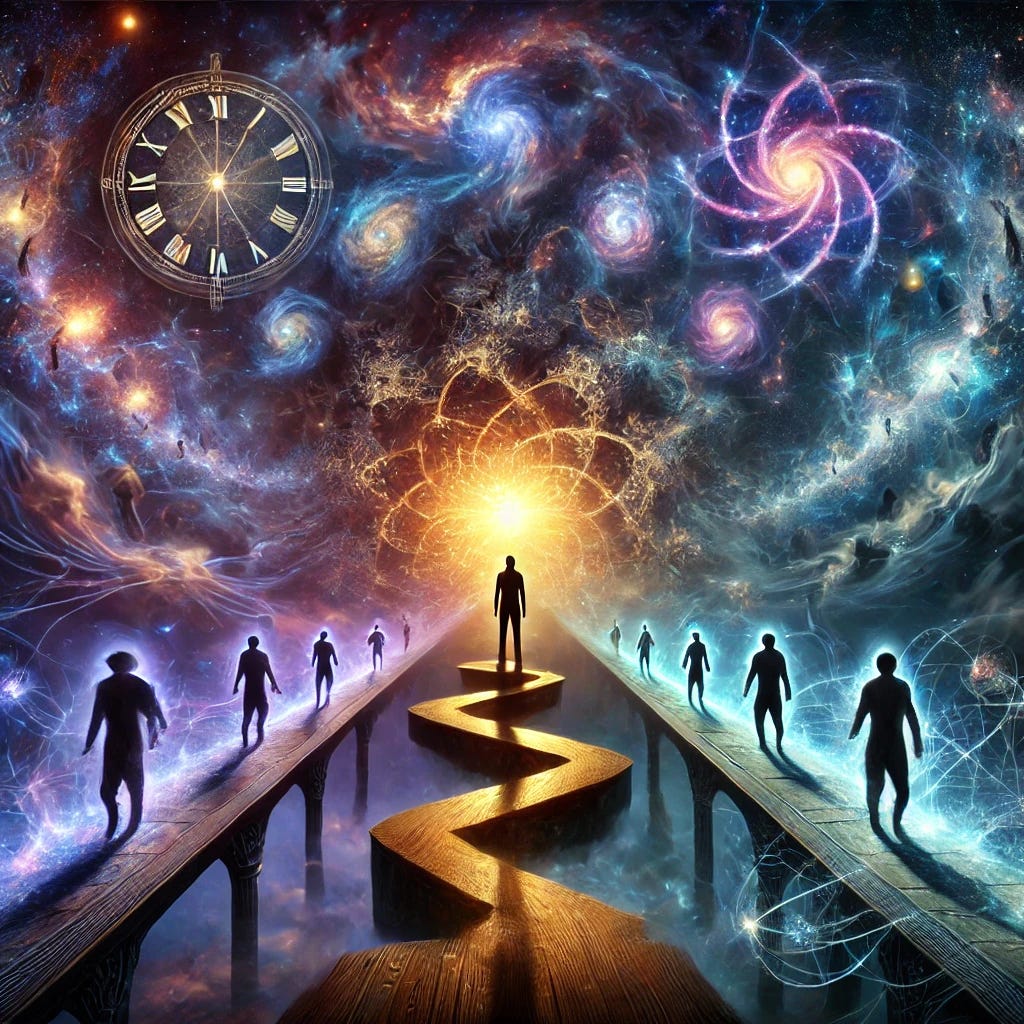Free Will and the Quantum Nature of Reality
The question of free will has long haunted philosophy, neuroscience, and physics.
Are we truly in control of our choices, or are they predetermined by the fundamental laws of the universe? Classical physics, built on deterministic principles, suggests that the past dictates the future in a predictable, cause-and-effect manner. However, quantum mechanics introduces uncertainty and probability, challenging the very nature of determinism.
If free will is real, it may be because quantum mechanics allows for it. If not, we may be living in a completely determined but fundamentally unknowable universe. Let’s explore the implications.
1. Classical Determinism: A Clockwork Universe
Before quantum mechanics, Newtonian physics dominated our understanding of reality. In this framework:
Every particle follows a precise trajectory, governed by forces and initial conditions.
If you knew the position and momentum of every particle in the universe, you could predict the future perfectly (Laplace's Demon).
Free will, in this view, is an illusion—our brains and thoughts are just chemical and electrical reactions following deterministic laws.
This rigid, cause-and-effect view of the universe leaves no room for genuine choice, suggesting that every action we take was predetermined from the beginning of time.
2. Quantum Mechanics: The Break in Determinism
With the rise of quantum mechanics, the idea of a deterministic universe was thrown into doubt. The fundamental principles of quantum physics introduce uncertainty and probability, meaning the future is not entirely fixed. Some key concepts:
Wave Function & Superposition: Until observed, a quantum particle exists in multiple possible states simultaneously (e.g., Schrödinger’s cat being both alive and dead).
Wave Function Collapse: Upon measurement, the wave function collapses into a single reality, selecting only one of the many possible states.
Heisenberg’s Uncertainty Principle: Certain pairs of properties (like position and momentum) cannot be simultaneously known with absolute precision.
These principles imply that not everything is determined, at least not in the way classical physics suggests. But does this mean we have free will?
3. The Role of the Observer: Do We Create Reality?
One of the most debated aspects of quantum mechanics is the role of the observer. Some interpretations suggest that conscious observation plays a role in wave function collapse. This idea has profound implications:
If observation affects physical reality, does the mind have a causal role in shaping events?
Could consciousness itself be a quantum process, generating free will?
Does the act of "choosing" collapse a quantum superposition into one definite reality?
Some physicists, like Roger Penrose, propose that quantum processes in the brain (e.g., within microtubules in neurons) might be the foundation of consciousness and free will. However, this remains highly speculative.
4. Quantum Indeterminacy vs. Free Will
Quantum mechanics allows for randomness, but does that equate to free will? There are two possibilities:
A. Quantum Indeterminacy Supports Free Will
If our decisions are influenced by quantum randomness, then free will could be an emergent property.
Instead of following a fixed deterministic path, our brains might use quantum mechanics to generate unique, non-determined choices.
Example: When choosing between two options, quantum fluctuations in brain activity might tip the scales unpredictably, giving rise to genuine choice.
B. Quantum Indeterminacy Does NOT Support Free Will
If decisions are purely random at a quantum level, that’s still not true free will—just chaos.
Free will requires agency, not just unpredictability.
Example: A quantum coin flip determining our choices isn’t the same as consciously deciding.
Thus, quantum mechanics might allow for some level of unpredictability, but whether that translates into genuine free will depends on whether conscious control can harness quantum effects.
5. The Deterministic but Unknowable Universe
Even if quantum mechanics breaks classical determinism, some physicists believe the universe remains deterministic at a deeper level:
Hidden Variable Theories: Some theories suggest that quantum randomness is just an illusion, and "hidden variables" (that we cannot currently observe) determine outcomes in a predictable way.
Superdeterminism: A radical view that suggests even quantum measurements are predetermined—meaning that what we choose to measure, and how we choose to measure it, was already set in stone.
If superdeterminism is true, then free will is completely illusory, and we are just playing out a script written by the universe, though we can never fully grasp it.
6. The Many-Worlds Interpretation: Every Choice is Made
One of the most mind-bending ideas in quantum mechanics is the Many-Worlds Interpretation (MWI):
Every time a quantum event occurs, the universe splits into multiple parallel realities, each representing a different outcome.
In this view, every possible choice we could have made actually happens in some branch of reality.
Instead of free will being a selection of one outcome, it could mean we experience only one of many predetermined paths.
This perspective raises philosophical questions:
Do we truly "choose" anything, or do we simply experience one reality while our other "selves" live out alternate choices?
Is free will just an illusion created by our subjective experience of a branching multiverse?
7. Conclusion: A Mystery at the Heart of Reality
The question of free will remains unresolved, but quantum mechanics provides fascinating possibilities:
If free will is real, it may stem from quantum indeterminacy allowing for choices that are neither fully random nor fully determined.
If free will is an illusion, we may live in a determined but fundamentally unknowable universe, where our choices feel real but were always inevitable.
What we do know:
Quantum mechanics has shattered classical determinism, but it has not yet proven free will. Whether we truly choose, or merely experience the unfolding of a probabilistic universe, remains one of the deepest mysteries in science and philosophy.


